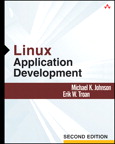
Application
Development
Michael K. Johnson
Erik W. Troan
 |
Linux
Application Development |
Michael K. Johnson Erik W. Troan |
/* phones.c -- simple phone database to illustrate Berkeley db */
/* This implements a very simple phone database. Full usage
information is given in the text. */
#include <alloca.h>
#include <db.h>
#include <errno.h>
#include <fcntl.h>
#include <stdio.h>
#include <stdlib.h>
#include <string.h>
#include <unistd.h>
void usage(void) {
fprintf(stderr, "usage: phones -a [-f] <name> <phone>\n");
fprintf(stderr, " -d <name>\n");
fprintf(stderr, " -q <name>\n");
fprintf(stderr, " -l\n");
exit(1);
}
/* Opens the database $HOME/.phonedb. If writeable is nonzero,
the database is opened for updating. If writeable is 0, the
database is opened read-only. An appropriate lock is put on
the database in either case. */
DB * openDatabase(int writeable) {
DB * db;
char * filename;
int flags;
struct flock lock;
/* Set up a lock on the entire file (l_len = 0 means
lock the whole file) */
lock.l_whence = SEEK_SET;
lock.l_start = 0;
lock.l_len = 0;
/* Set the open and lock modes */
if (writeable) {
flags = O_CREAT | O_RDWR;
lock.l_type = F_WRLCK;
} else {
flags = O_RDONLY;
lock.l_type = F_RDLCK;
}
filename = alloca(strlen(getenv("HOME")) + 20);
strcpy(filename, getenv("HOME"));
strcat(filename, "/.phonedb");
db = dbopen(filename, flags, 0666, DB_HASH, NULL);
if (!db) {
fprintf(stderr, "failed to open %s: %s\n", filename,
strerror(errno));
return NULL;
}
/* Now that the database is open, lock it */
if (fcntl(db->fd(db), F_SETLK, &lock)) {
if (errno == EAGAIN)
fprintf(stderr, "the phone database is already "
"locked\n");
else
fprintf(stderr, "failed to lock database: %s\n",
strerror(errno));
return NULL;
}
return db;
}
/* add a new record to the database; this parses the
command-line arguments directly */
int addRecord(int argc, char ** argv) {
DB * db;
char * name, * phone;
DBT key, value;
int rc = 0;
int overwrite = 0;
/* check for our parameters; -f means overwrite an
existing entry, and the name and phone number should
be all that remains */
if (!argc) usage();
if (!strcmp(argv[0], "-f")) {
overwrite = 1;
argc--, argv++;
}
if (argc != 2) usage();
name = argv[0];
phone = argv[1];
/* open the database for writing */
if (!(db = openDatabase(1))) return 1;
key.data = name;
/* the +1 writes the trailing '\0' to the file */
key.size = strlen(name) + 1;
/* if we shouldn't overwrite an existing entry, check
to see if this name is already used */
if (!overwrite) {
rc = db->get(db, &key, &value, 0);
if (rc == -1) {
fprintf(stderr, "get failed: %s\n", strerror(errno));
rc = 1;
} else if (!rc) {
fprintf(stderr, "%s already listed as %s\n", name,
(char *) value.data);
rc = 1;
} else {
rc = 0 ;
}
}
/* if everything has worked so far, update the database */
if (!rc) {
value.data = phone;
value.size = strlen(phone) + 1;
if (db->put(db, &key, &value, 0)) {
fprintf(stderr, "put failed: %s\n", strerror(errno));
rc = 1;
}
}
db->close(db);
return rc;
}
/* looks up a name, and prints the phone number associated
with it; parses the command line directly */
int queryRecord(int argc, char ** argv) {
DB * db;
DBT key, value;
int rc;
/* only one argument is expected, a name to look up */
if (argc != 1) usage();
/* open the database for reading */
if (!(db = openDatabase(0))) return 1;
/* set up the key to look up */
key.data = argv[0];
key.size = strlen(argv[0]) + 1;
rc = db->get(db, &key, &value, 0);
if (rc == -1) {
fprintf(stderr, "get failed: %s\n", strerror(errno));
rc = 1;
} else if (rc) {
fprintf(stderr, "%s is not listed\n", argv[0]);
rc = 1;
} else {
printf("%s %s\n", argv[0], (char *) value.data);
rc = 0;
}
db->close(db);
return rc;
}
/* delete the specified record; the name is passed as a
command-line argument */
int delRecord(int argc, char ** argv) {
DB * db;
DBT key;
int rc;
/* only a single argument is expected */
if (argc != 1) usage();
/* open the database for updating */
if (!(db = openDatabase(1))) return 1;
/* set up the key */
key.data = argv[0];
key.size = strlen(argv[0]) + 1;
rc = db->del(db, &key, 0);
if (rc == -1) {
fprintf(stderr, "del failed: %s\n", strerror(errno));
rc = 1;
} else if (rc) {
fprintf(stderr, "%s is not listed\n", argv[0]);
rc = 1;
}
db->close(db);
return rc;
}
/* lists all of the records in the database */
int listRecords(void) {
DB * db;
DBT key, value;
int rc;
int flags = R_FIRST;
/* open the database read-only */
if (!(db = openDatabase(0))) return 1;
/* iterate over all of the records */
while (!(rc = db->seq(db, &key, &value, flags))) {
flags = R_NEXT;
printf("%s %s\n", (char *) key.data, (char *) value.data);
}
if (rc == -1) {
fprintf(stderr, "seq failed: %s\n", strerror(errno));
rc = 1;
} else {
rc = 0;
}
db->close(db);
return rc;
}
int main(int argc, char ** argv) {
if (argc == 1) usage();
/* look for a mode flag, and call the appropriate function
with the remainder of the arguments */
if (!strcmp(argv[1], "-a"))
return addRecord(argc - 2, argv + 2);
else if (!strcmp(argv[1], "-q"))
return queryRecord(argc - 2, argv + 2);
else if (!strcmp(argv[1], "-d"))
return delRecord(argc - 2, argv + 2);
else if (!strcmp(argv[1], "-l")) {
if (argc != 2) usage();
return listRecords();
}
usage(); /* did not recognize any options */
return 0; /* doesn't get here due to usage() */
}